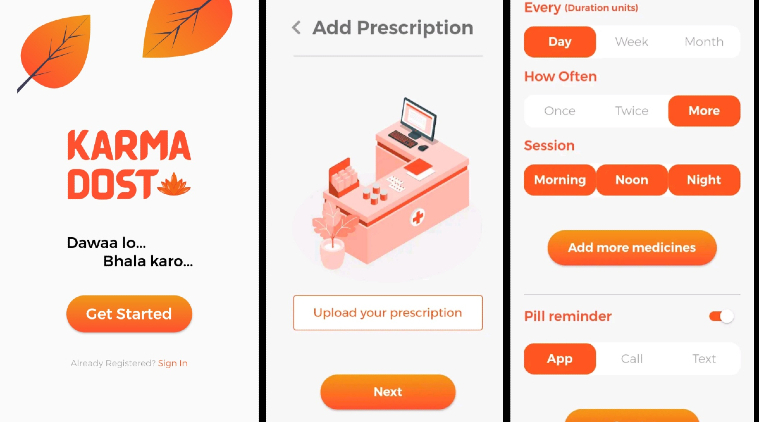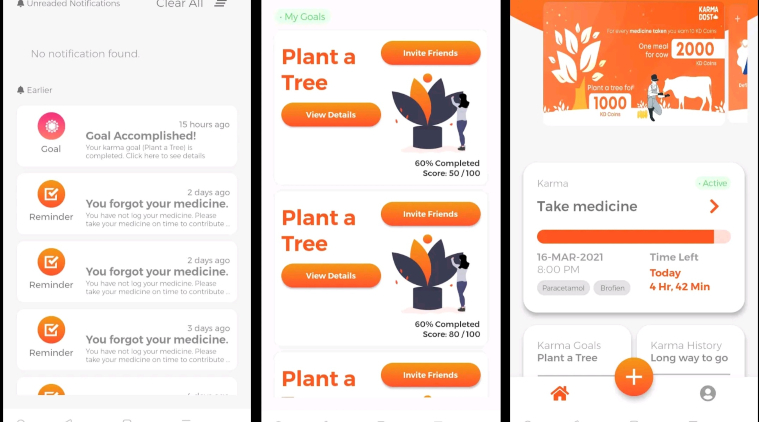[ad_1]
When a doctor prescribes you a medicine, the timings and duration of the doses can be a bit confusing, especially when if you have lost the prescription or forgot to take a pill accidentally. These are some of the most common causes of poor adherence which could have dramatic side effects if patients have chronic issues like diabetes or heart ailments. That’s where Karma Dost comes in, a smartphone app that nudges you to take medicines on time.
“For a long time, the traditional model has been that someone reminds us to take medicine and if they forget…I also forget. We picked up that theme and said what if we recreate that environment in a digital-first environment,” Amit Choudhary, Co-founder and CEO of Dawaa Dost, describes the idea behind the Karma Dost app.
Medication adherence is a less-discussed and often overlooked topic in healthcare. In fact, half of Americans with chronic illnesses stop taking medications within a year of the initial prescription, according to the Centers for Disease Control and Prevention. In India, although there is no scientific data available, experts say the adherence rate is well below 10 per cent which is on the lower side.
 A future update will see the ability to digitise the prescription by scanning the photograph using the phone’s camera. (Image credit: Dawaa Dost)
A future update will see the ability to digitise the prescription by scanning the photograph using the phone’s camera. (Image credit: Dawaa Dost)
“Most people in India take a medicine for the first three days and then stop a 5-day course midway because they are feeling better,” he said, adding that people often don’t stick to the prescription plan due to fear of adapting to a new schedule and lack of information on when to take medicine (eg some pills are meant to be taken before a meal and others might be taken twice a day).
The concept of a medication-reminder app like Karma Dost is simple: let your smartphone remind you when to take medicine as prescribed by your doctor without any assistance from a family member and ensure the treatment plan is followed. The app lets you create a list of your medications by uploading the prescription or just by typing the name of the medicine. You can then schedule notifications on your phone when it’s time to take them exactly as prescribed by choosing the number of days, weeks or months the pill needs to be taken and setting a specific time of the day depending on the medication and the condition you are treating for. Repeat it for every medicine you take. You can indicate the form of medicine – tablet or capsule by its colour and size, which makes it easy for users to add medication if they don’t remember the name of the pill.
Once you set a pill reminder, you can then customise how you want the notification to be delivered, through the app, in the form of calls or text messages. When you receive an in-app notification or a reminder call, it’s an indicator that you have taken medicine or skipped the dose. Choudhary says 80 to 85 per cent of users who are using the app have opted for getting pill reminders in the form of calls. “On average, between 8 and 9:30 am, which is the morning hour per medicine, we are doing 70,000 to 75,000 calls a day,” he said.

 Out of the total user base, a large section of Karma Dost app users are elderly. (Image credit: Dawaa Dost)
Out of the total user base, a large section of Karma Dost app users are elderly. (Image credit: Dawaa Dost)
The app, which went live last year and is only available on Android-based smartphones, has currently over 75,000 monthly active users at present and growing. The Karma Dost app has no ads or premium features that you need to pay to unlock. It’s a free app, and Choudhary has no intention, for now, to turn Karma Dost into a “service”, a business model followed by many in the industry to grow the user base.
But what makes Karma Dost different from other medication-reminder apps is the Karma feature and hence the name Karma Dost. If a user takes the medicine on time, say for the next seven days, they earn KD coins which can be used for social causes like planting a tree, sponsoring a girl child’s education for a day or feeding a cow.
The recent launch of a new Medications tool in the Health app on the iPhone by Apple has again focused on nonadherence to medications and how big this problem is at the global level. While Choudhary welcomes Apple acknowledging medication non-adherence and solving the problem in its own unique way, he said Karma Dost is a better solution designed keeping a billion Indian users in mind. Some may question the effectiveness of medication-reminders apps and pill-pack services, but Choudhary claims the adherence rate among Karma Dost users has actually improved by 40 to 50 per cent.
Dawaa Dost, co-founded by Choudhary with Yash Harlalka and Anirudh Batwara in 2018, is an omnichannel pharmacy retail chain that aims to address India’s mammoth healthcare problems by making medicines available at affordable rates. The Jaipur-based startup primarily focuses on tier-2 and 3 cities and also owns platforms such as Medwiki which offers short-form videos on treatments and Karma Dost.
Choudhary, who has worked with FMCG giant Procter & Gamble and e-commerce shopping platform Snapdeal in the past, says the Karma Dost app will continue to get improvements through new features and experiences. For example, in the coming weeks, the company plans to release a new feature where you can download the app for your parents, digitize the prescription and leave their number and the WhatsApp chatbot will handle the rest of the things. This will make the reminder feature simpler but without actually downloading the app on your phone.
The plan is also to add an improved voice-recognition feature built into the app which the company is currently building and the update be released in the coming months. “In the past, we have tried building a voice search capability but the challenge is that the medicine names in India are so complex that even very well-educated people struggle to pronounce them correctly. So any kind of machine learning models effectively fails because they need a certain degree of quality of input for them to get what you’re saying,” he said.
Karma Dost is end-to-end encrypted, meaning the company can’t read or otherwise access the data. Choudhary admits healthcare data is critical and that keeping data secure is key to protecting patient privacy. The app will get a two-factor authentication feature, which adds an additional layer of security to the authentication process by making it harder for attackers to gain access to a person’s medical history.
!function(f,b,e,v,n,t,s)
{if(f.fbq)return;n=f.fbq=function(){n.callMethod?
n.callMethod.apply(n,arguments):n.queue.push(arguments)};
if(!f._fbq)f._fbq=n;n.push=n;n.loaded=!0;n.version=’2.0′;
n.queue=[];t=b.createElement(e);t.async=!0;
t.src=v;s=b.getElementsByTagName(e)[0];
s.parentNode.insertBefore(t,s)}(window, document,’script’,
‘https://connect.facebook.net/en_US/fbevents.js’);
fbq(‘init’, ‘444470064056909’);
fbq(‘track’, ‘PageView’);
[ad_2]
Source link


